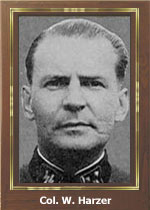
|
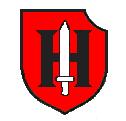
9th SS Hohenstaufen
Col. W. Harzer
|
| The
9th was to defeat the Airborne forces in the area of Oosterbeek and the landing zones |
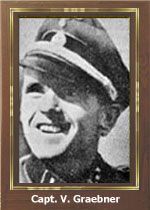 |
9th S.S. Recce Battalion
S.S. Capt. Victor Eberhardt Graebner |
| This
unit consisted of 40 half tracks and armoured cars and approximately 400 men, less ten
vehicles, which were retained as a reserve. These were sent south to Nijmegen on the 17th. This was the unit which made the futile
charge across Arnhem bridge on the morning of Monday the 18th September. |

|
9th S.S.
A/Tank Battalion Panzerjager 9 |
This Battalion consisted of self-propelled anti-tank guns, their
numbers unknown. It was stationed at the junction of Ede-Arnhem road and Dreyenseweg, at
approx 1500hrs on the 17th. |
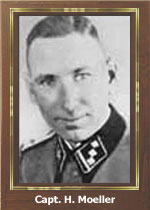
|
9th S.S. Kampfgruppe Moeller
SS-Captain Hans Moeller |
At 1630hrs on the 17th this unit of 80 to 90 men was in area of
Den Brink. They had two flame throwers and a high number of machine-guns. |

|
9th S.S.
Panzer Grenadier Regiment 20 |
This regiment was attacked by the 1st Para Battalion at 0500hrs on
the 19th in positions close to the north bank of the Rhine and was forced to retreat. No
further details are known. |
 |
9th S.S. A/A Battery .S.S.
Lt. Gropp |
| Consisting
of 87 men with one 88mm and one 20mm anti-aircraft gun, this Battery took up positions in
the area of the railway marshalling yards on the 18th. |
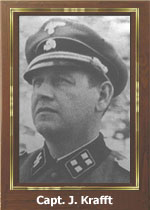 |
S.S. Pzr Grenadier Battalion 16
S.S. Capt J. Krafft |
| This
Battalion was situated in the woods at Wolfheze. It was three companies strong plus
attached units. Forward elements were in position to fire on the gliders on LZ 'S'. It
played a very desicive roll in the early face of the battle. |
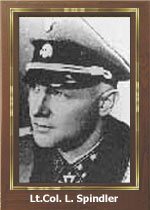 |
Kampfgruppe Spindler
SS Lieutenant-Colonel Spindler |
This unit established the first defence line along the
Dreyenseweg, cutting the route between the landing zones and the bridge. Initally it had
two companies of artillerymen, acting as infantry. Each company consisted of 120 men. |
 |
Kampfgruppe Brinkmann
Brinkmann |
| This
Ex Frundsberg Recce. Battalion 10 was given to 9th S.S. in exchange for Graebners
unit and was ordered to secure the road bridge. |
 |
S.S. A/A Company and A/A Battalion
CO known by author |
The names and numbers of this company are unknown, but it had no
less than ten vehicles, all half-tracks armed with 20mm and 37mm A/A guns. It was inserted
into the defence line north of Oosterbeek.
One of the CO's
commanded a group of 6 Mobelwagen including one with a double (zwilling) mount that they
had picked up at Schwetzingen. The crew commanders were issued with technical data
books to record the performance of the weapons systems for the WaPruf. They were ordered
to destroy the vehicles and the literature if imminent capture were to happen. They
were stationed in Enschede after picking up the Mobelwagen and moved to Arhem. They
arrived on the second day. |
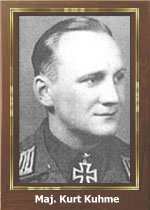 |
Sturmgeschützbrigade 280
Major Kurt
Kühme |
| On
the 19th this Brigade advanced with 10 assault guns from Arnhem town up Utrechtseweg towards the P.G.E.M.,
building. It was first held off by PIAT fire, but then broke into the 11th Para Battalion
positions. |
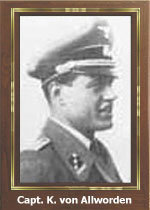 |
Kampfgruppe Von Allworden
S.S. Capt. Klaus Von Allworden |
| Made
up of three infantry companies, two MK IV self-propelled guns and one towed PAK 40 A/Tank
gun, this unit was on the Dreyenseweg on the afternoon of the 17th and blocked the advance
of 1st and 3rd Para Battalions. |
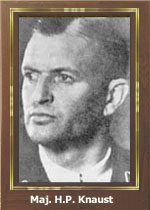 |
Training and Replacement Regiment: Bocholt
Maj. Hans Peter Knaust |
| On
the 18th, Maj. Knaust, commanding this regiment was able to field eight MK.III and MK.IV
tanks plus four companies of Panzergrenadiers. On the 19th he was supplied with two Tiger
tanks to fight at the bridge. |
| |
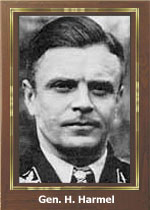 |
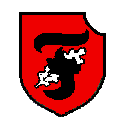
10th SS Frundsberg
Col. H. Harmel |
The 10th S.S. Panzer Division - Frundsberg General
H. Harmel was stationed on the far side of the river ijssel, further to the east of
Arnhem. It was to advance south to attack the enemy at Nijmegen. |
 |
10th S.S.
Engineers Battalion |
With the Arnhem bridge blocked by Frost's 2nd Para Bn., this unit
set up a ferrying operation at Pannerden on the 18th. They enabled the remainder of 10th
S.S. to advance to Nijmegen. |
 |
10th S.S. - Grenadier Regiment 21. 3rd Company
SS Obersturmfuhrer Vogel |
This company first made contact with the Airborne in the area of
the church close to the road bridge. The numbers are unknown, but it was short of arms and
many captured British weapons were used. |
 |
Kampfgruppe Harder
Harder |
Three companies strong, this unit was made up of tank crews,
logistics personell and sailors. It had three tanks which it lost early in the fighting.
It occupied a position running south from Oosterbeek Station to the Rhine. |
 |
S.S.
Panzer Grenadier Regiments 19 and 20 |
Each of the regiments supplied a 'Combat Team' but there is no
further information available. |
 |
Hermann Goering Training Regiment |
On the 18th this unit arrived from Katwijk-Aan-Zee by bicycle. No
further information. |
 |
1st
Battalion Fallschirmjager Regiment 22 |
This unit arrived at Arnhem station on the 19th, came under fire
and was immediately withdrawn to Dieren-Doesburg. No further info available. |
 |
1st
Battalion Fallschirmjager Regiment 2 |
No further information available at the moment. |
 |
Kampfgruppe Weber
Capt. W. Weber |
This unit consisted of 90 men, ex-Luftwaffe signalers and students
of the Radar Traning School under the command of Cpt. Willie Weber. It came south from
Deelen airfield and took up positions at the N.E. corner of LZ 'S'. It was later taken
under the command of Krafft. Also fought at Driel against the Poles. |
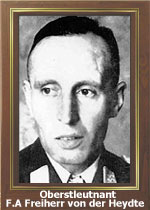 |
Fallschirmjager
Regiment 6
Oberstleutnant von der Heydte |
This regiment was four Battalions strong. Each Bn. had 150-200 men
with mortars, anti-aircraft guns and combat engineer attached. There is no further
Information about their exact strength.
back to the other statistics |



















